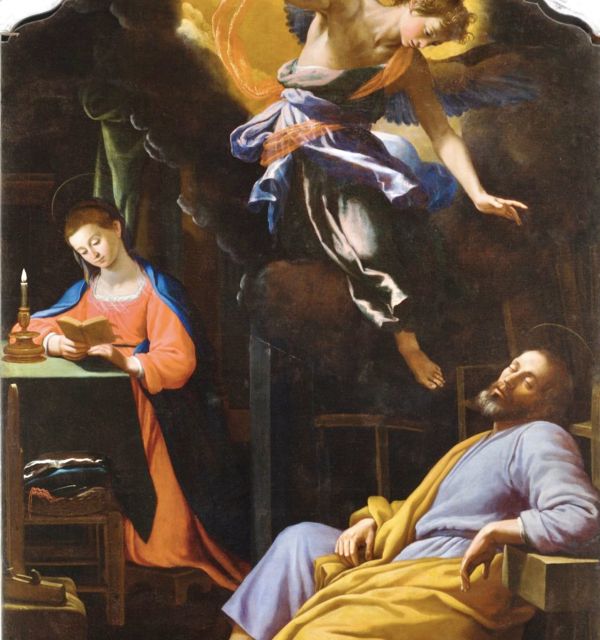Today's Gospel tells of the announcement made by the angel to Joseph, inviting him to take Mary with him, since the child begotten in her was the fruit of the Holy Spirit.
Joseph's marvellous obedience recalls that before the Crucifix at San Damiano by Francis, and invites the latter to accept a new call.
Consulting the Franciscan Sources we read:
"As he was passing near the church of San Damiano, he was inspired to enter it. He went there, and began to pray fervently before the image of the Crucifix, who spoke to him with moving goodness:
"Francis, do you not see that my house is falling down? Go, then, and restore it". Trembling and astonished, the young man replied:
"I will do it gladly, Lord".
But he had misunderstood: he thought it was about that church which, because of its antiquity, threatened imminent ruin. At those words of Christ he became immensely happy and radiant; he felt in his soul that it was really the Crucified One who had given him the message.
As he came out of the church, he found the priest sitting there beside him, and putting his hand in his purse, he offered him money, saying:
"Sir, I beg you to buy oil to make a lamp burn before that Crucifix.
When this money is finished, I will bring you more, according to need'" (FF1411).
"Following this vision, his heart yearned, as if wounded, at the memory of the passion of the Lord [...]" (FF1412).
Aware of his calling, Francis awoke from the vision he had and, shortly after his conversion, welcomed Clare of Assisi, his seedling and faithful disciple, to the Portiuncula:
"Abandoning, therefore, home, city and relatives, he hastened to St Mary of the Portiuncula, where the friars, who were keeping vigil in prayer at the little altar of God, welcomed the virgin Clare with lighted torches.
There at once, having renounced the filth of Babylon, she delivered to the world the libel of repudiation; there, letting her hair fall by the hand of the friars, she laid aside for ever the variegated ornaments" (FF 3170).
Joseph, through his special calling, adhered to God's will and Francis, through the call of the Crucified One, understood what the Lord destined him for. Joseph welcomed Mary, the Mother of Jesus and
the new man of the plain of Assisi welcomed Clare, who became the Mother of the Second (Clarian) Franciscan Order. For this gift the Spirit of God used both of them, to bring it to light. Clare generated many virgins to Christ in San Damiano.
The Legend informs us:
"This is the famous church for the restoration of which Francis laboured with admirable zeal [...]" (FF 3175).
In this tiny place Clare shut herself away and:
"Placing her nest, like a silvery dove, in the hollow of this cliff, she generated a host of virgins of Christ, founded a holy monastery and began the Order of Poor Ladies" (FF 3176).
«Joseph, son of David, do not be afraid to take Mary, your wife, with you. For that which is begotten in her is of the Holy Spirit» (Mt 1:20)
[St Joseph (Mt 1:16.18-21.24a)]












